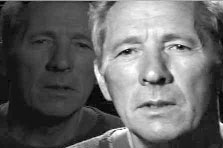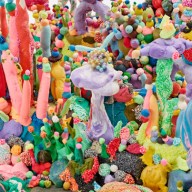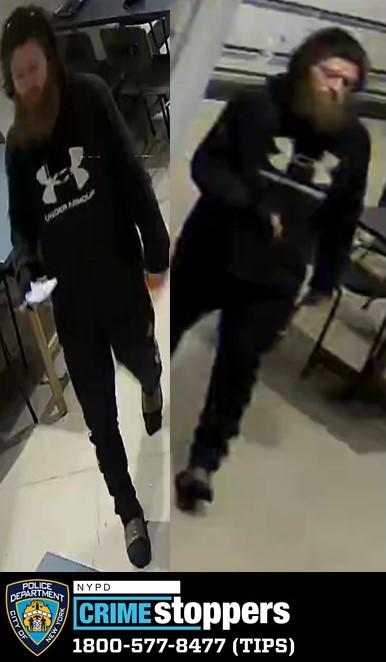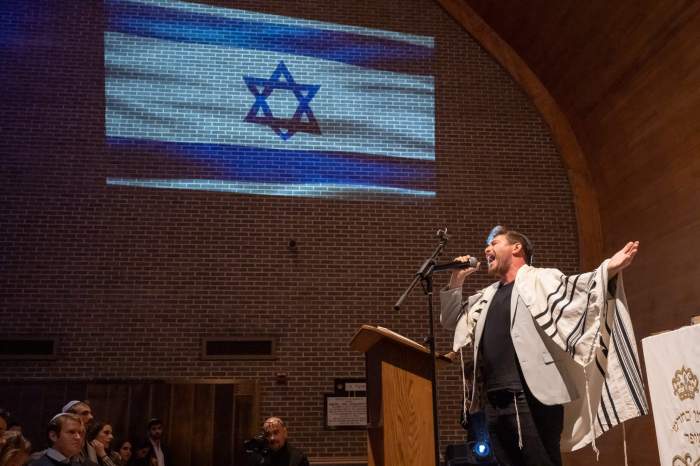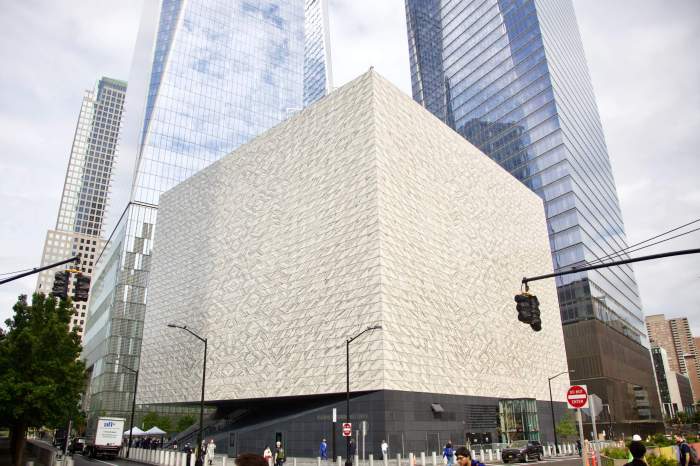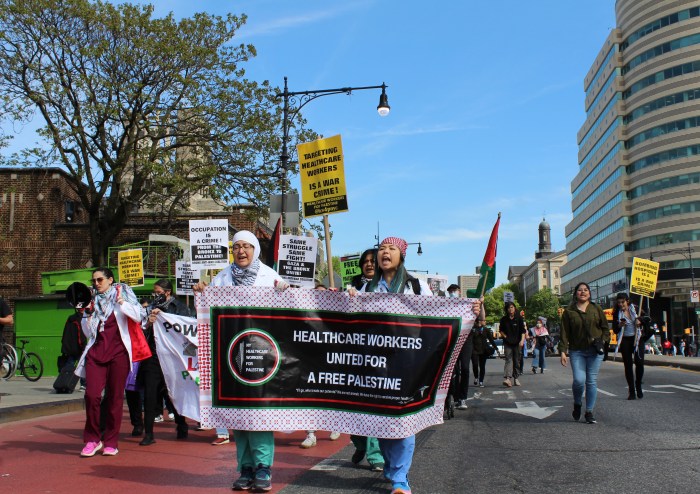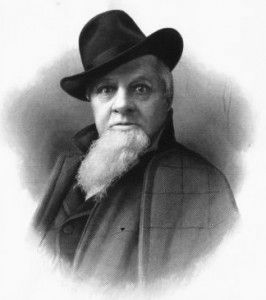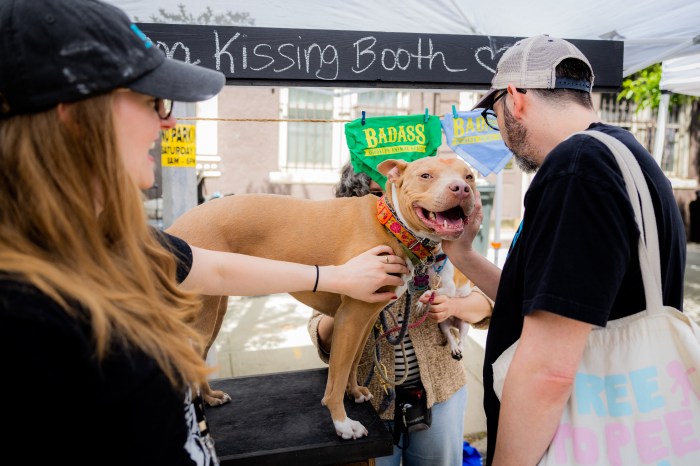By JERRY TALLMER
He and his wife and everybody else in the 11th Street neighborhood held their breaths, waiting for the sound of a crash. There was a distant thud. And then, within minutes, the telephone rang. It was Gill’s father, retired school administrator Ken Adams, calling from London. “You might want to have a look at the telly,” he said
“He hadn’t made the connection to his grandchildren at all,” says Horovitz, “but we knew that Oliver and all the other kids at Stuyvesant were right across the street from the World Trade Center.”
Oliver, then age 15, is one of Horovitz’s five children. Oliver’s twin sister Hannah was at that moment in class at La Guardia High School, five miles north of the WTC, but Oliver — who knew where he was? Inside Stuyvesant? On the street? Was there anything left of Stuyvesant High? Was Oliver alive? Was he dead?
Oliver’s father’s written recall of that hideous moment, that day, the nightmare of days that immediately followed, became a testament called “3 Weeks After Paradise,” which in turn became a theater piece that was done and keeps getting done (by one or another solo actor) around the world.
The first such actor — on the first anniversary of 9/11/01 — was Mel England, who was four blocks from the WTC when the planes hit, and lost his friend Mychal Judge, the Fire Department chaplain, in the fall of the first tower.
At 3 p.m. this later day, Thursday, September 11, 2003, the second anniversary of 9/11/01, Mel England will perform “3 Weeks After Paradise” at the Cherry Lane Theatre on Commerce Street, for benefit of the Children of WTC Victims CUNY Scholarship Fund.
“3 Weeks After Paradise” was subsequently made into a 52-minute documentary film “with lots of family footage” that’s been widely broadcast — 25 times, to date — by Bravo television. There will be a screening of it at 6:30 p.m., Thursday Sept. 11, at the CUNY Graduate Center, Fifth Avenue and 34th Street — the old Altman’s building — will be introduced by Horovitz, who dryly terms himself the “talking head” of the film. Afterward, he’ll conduct a give-and-take with the audience.
Actually, on that frightful 2001 morning, 15-year-old Oliver Horovitz was very much alive, and, with all his schoolmates and teachers, taking in everything that was happening right in front of his eyes — the buildings on fire, the people leaping to their death, one by one, two by two, the buildings exploding, collapsing, first one, then the other . . .
Israel and Gill Horovitz go out on their bicycles, bound for Stuyvesant High. The human tide pressing north prevents any hope of reaching the school, or what may remain of the school.
“I imagine myself in Oliver’s skin,” Horovitz will write. “I am 15 and have just learned that the towers are burning, just across the road . . . I am sure that I, at age 15, would have wanted a much closer look . . . We decide to return home, to call the school, to wait for Ollie’s call. We reach home just in time to watch the towers fall.”
The images replay on television 50 times in five minutes. “The doorbell rings. It is my oldest son, Matthew,” a 39-year-old basketball fanatic and TV sports writer-editor-producer who lives with his wife Kelly on West Street, diagonally up from Ollie’s school. Matthew is white-faced. “I’ll go see,” he says. “I’ll call you.”
Time passes. The TV plays. Matthew phones. By now, Israel Horovitz, who prides himself as a runner, is sitting on the floor. His legs have given out. Suddenly, Matthew yells over the phone: “The Stuy kids are walking up the West Side Highway with their teachers! They’re okay!”
But nothing is okay, not really, nor will it ever be again — not like it was, all of Israel’s life, all of all our lives, before this day.
“It’s gone. It was there as long as I’ve been a New Yorker,” the playwright born and bred in Wakefield, Mass., will write, “but now it’s gone.” The sense of safety, of innocence, that’s what’s gone, he will say to the lifelong New Yorker, myself, who first laid eyes on Horovitz and his work when scared, skinny, cocky Israel filled in for some missing actor at the premier of a very young Israel’s own “Line” at Ellen Stewart’s La MaMa, upstairs on Second Avenue, a thousand years ago. “New York’s safety and innocence — that’s what Paradise meant to me,” 64-years-young Israel will now say.
“I resent my children’s smiles, my wife’s good nature,” he writes in that 9/11 testament. “Can they not smell death in the air as I do? And the two thousand photographs on the ‘Missing Persons’ walls, just outside our door at St. Vincent’s and The New School and Ray’s Pizza? . . .
“I see a policeman today. He is no more than 40, mustachioed, dapper. I am out running, which is, of late, a shuffle of despair. He is alone on the corner of Ninth Avenue and 17th Street, guarding God only knows what. He seems so sad.
“ ‘How are you?’ I ask, if only to let him know he is not invisible. ‘Not so good,’ he answers. And he begins to sob, turns away. I touch his arm, and move along the road, allowing him his illusion of dignity. A sobbing policeman? Can this be the same pig I so detested in 1968?”
For a while after 9/11, Oliver preferred to sleep on the floor. “I’m all right,” he assured his parents, “I’m just having a little trouble sleeping.” Then Stanley Teitel, the principal at Stuyvesant High, asked Oliver to create a film about 9/11 to be shown in every home room when students and staff returned from temporary evacuation to Brooklyn Tech. Oliver immediately manifested signs of emotional improvement.
Horovitz, meanwhile, was having hideous dreams of desperate hand-to-hand Superman combat in airliners against highjackers armed with box cutters. He’d awake in a screaming sweat.
“In that wretched condition I started seeing a shrink — Dr. Carl Berg, who lives in the Village. One day I said to him: ‘My son’s been working on something, this film for his school, and seems to be a lot better. Should I do something?’ The psychiatrist looked at me and said: ‘Hel-lo — of course.’ ”
That’s when Horovitz started writing what would turn into “3 Weeks Ater Paradise.”
It wasn’t intended as a performance piece, he says. It was simply home therapy. But after a while he started e-mailing bits of it to friends and associates.
“It had been a very busy time, just then. Plays, movies, other work. So the e-mails were to show: This is why I’ve disappeared from my life — and what it’s like, right now, in Downtown New York.
“And to a man,” says Horovitz, “these people started putting it on stage. Alan Ayckbourn put it on stage in London. It began getting published all over the world. Was the No. 1 spoken-word CD in Germany for six months.
“Then I was approached by several young filmmakers, all from New York City. I should tell you that some of them were Muslims, and that it was important for them, these Muslims, to work on the film. We made the film, showed it to Bravo, and Bravo put a significant amount of money toward a fund I started, a CUNY scholarship fund for the kids of poor people — restaurant workers, prep chefs, illegal employees — who died in 9/11. We’ve raised a couple of hundred thousand dollars through the film and the stage piece.”
Israel Horovitz has a son named Adam who is one of rap’s Beastie Boys, and thus much more famous than his father. Horovitz also has a daughter named Rachael who was executive producer of the Jack Nicholson movie “About Schmidt.” In the three weeks after 9/11, Horovitz smiled only once, when Rachael sent him a cartoon of the Taliban being threatened with: “Turn over bin Laden or we will let your women go to college.”
But it was also Rachael who, at 15, Oliver’s age two years ago, had said to her father: “I think the people in our lives who cause us the most trouble are exactly the people we always knew would cause us the most trouble.”
Horovitz knows that now. “I keep telling myself ‘Better days ahead,’ but I don’t believe it for a second,” he writes. “I only believe that I will cope better . . . I will put this all somewhere in the inner reaches of my brain — in a special place reserved for Hitler and my raging father” — the Wakefield truck driver who had been beaten as a child, became a lawyer at 50, and spent a whole life being “angry . . . because he was angry.” Israel wrote a play about him. It was produced at Off-Broadway’s WPA. “Unexpected Tenderness” it was called.
“It’s strange,” Israel Horovitz said on the phone the other night. “Terrence McNally and I just did a duet up at Gloucester (Mass.) — a play of his back to back with a play of mine. We got talking, and Terrence said: ‘All my life I’ve always thought things were going to turn out okay.’ ”
Send for the mirror, somebody. The key line of ‘3 Weeks After Paradise” is: “Not once in my life have I ever thought that anything would work out okay.” So we have a funny-house mirror that really isn’t funny.



